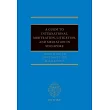In a novel approach that the author terms "symbolic paradigm analysis," Paradise and Paradigm offers a "theoretically modular" systematic comparison of two "Persian" religions: early Syriac Christianity as the foundation of the East Syrian "Church of the East" (the Nestorian Church of Persia) and the Baha’i Faith, a new world religion. The author compares the hymns of the greatest poet of early Christianity, Saint Ephrem the Syrian, and the richly imagistic writings of the founder of the Baha’i religion, Baha’u’llah. The book employs an original analytic technique in the creation of "symbolic profiles" constructed on Ninian Smart’s dimensional model of religion. As Buck skillfully demonstrates, formal similarities between any two religions are best comprehended in terms of paradigmatic differences, which nuance all parallels through a process of symbolic transformation. Buck also shows the communal reflexivity of paradise imagery in representing the ideal faith-community in both traditions.



 天天爆殺
天天爆殺  今日66折
今日66折 

























 博客來
博客來 博客來
博客來 博客來
博客來 博客來
博客來 博客來
博客來